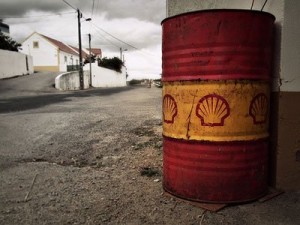 (Reuters) - Britain has blocked efforts by oil major Royal Dutch Shell to settle a $2.3 billion debt it owes Iran by paying in kind with grains or pharmaceuticals, industry sources said.
(Reuters) - Britain has blocked efforts by oil major Royal Dutch Shell to settle a $2.3 billion debt it owes Iran by paying in kind with grains or pharmaceuticals, industry sources said.Shell has been trying for months to find a way to work around international sanctions that prevent it paying in currency for crude it bought from the National Iranian Oil Company before a European Union embargo on Iran that started last July.
The sources said the British government was reluctant to provide relief for the Iranian economy when Western powers are using sanctions to apply financial pressure on Tehran to dismantle its nuclear programme.
"The view is that doesn't make sense to smooth the way for a payment that helps Iran when government is trying to press Iran to negotiate," said an industry source.
A government spokesman declined comment on the Shell case but said: "The government fully backs the tough regime of EU sanctions that have been put in place against Iran."
Talks earlier this month between Iran and six world powers including Britain failed to make progress in resolving a decade-old dispute around Iran's nuclear progress. Another round of negotiations has been scheduled for May 21.
The industry sources said Shell in February explored with the British government the possibility of asking British pharmaceuticals maker GSK to deliver medicines to Iran in a payment-in-kind deal known as an offset agreement.
GSK said it had not been approached or held any discussions on the matter. Shell declined comment.
In October, the Anglo-Dutch oil company sought permission for an offset agreement that would have seen U.S. agricultural trader Cargill deliver grain to Iran.
Following publication by Reuters, Dutch foreign minister Frans Timmermans in a letter to parliament acknowledged the proposal, saying: "As in all sanctions regimes there are some carefully defined exceptions applicable for which in certain cases an exemption can be granted by national governments."
Meetings were held with Cargill but, said the industry sources, the proposal was turned down by the British government. Cargill and Shell both declined comment at the time.
MAINTAINING IRAN RELATIONSHIP
The sources said the oil company wanted to repay its debt to NIOC to maintain cordial relations with Iran, one of the biggest producers in the Organization of the Petroleum Exporting Countries.
"Politics come and go but it's in the interests of Shell and its shareholders to pay its debts and maintain a relationship with a leading oil producer like Iran," said one of the sources.
Shell revealed in a March filing to U.S. regulatory authorities that it owed Tehran $2.3 billion and made a net loss of $6 million trading Iranian oil in 2012. Unlike its rivals, Shell continued trading with Iran under a provision for pre-existing contracts close to the EU's June 30 deadline before the embargo. The debt is for oil purchased in 2011 and 2012.
Iran's oil revenues have fallen by about 50 percent since sanctions were imposed last year, and regional economists believe it has been forced to draw on its foreign reserves to help buy essentials like grains.
But with an estimated $100 billion of foreign reserves at the start of 2012, thanks to high oil prices, the Iranian economy is far from collapse.
The International Monetary Fund said last week that while sanctions had frozen Iran out of the international banking system, Tehran was avoiding a balance-of-payments crisis and should emerge from recession in 2014.
Food and medicine are among the humanitarian goods not barred by U.S. and European sanctions but, isolated from international banking, Iran has been forced to pay a premium for grain imports.
Washington has tried to restrict countries like China, India, South Korea and Japan that still buy Iranian oil to paying for shipments by the barter of approved goods - including food and medicine.
U.S. sanctions state that funds used to pay for oil must remain in a bank account in the purchasing country and can be used only for non-sanctioned, bilateral trade between that country and Iran. Any bank that repatriates the money or transfers it to a third country faces a U.S. sanction risk.
Nevertheless, said the industry sources, it appears the British government would rather Iran be obliged to spend foreign reserves or use oil revenues to barter for essential imports than benefit from shipments of humanitarian goods paid for by Shell debt.
By Reuters
The Iran Project is not responsible for the content of quoted articles.










